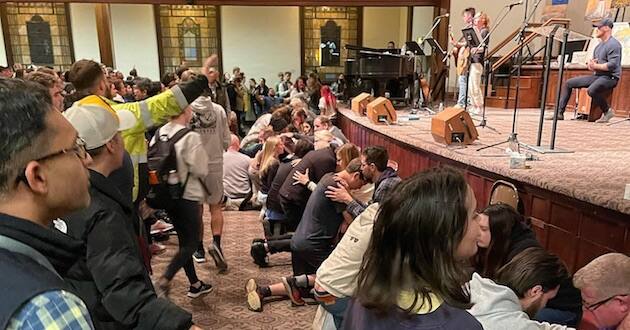Asbury University ends on-campus revival service

What’s being called the Asbury Revival is ending at Asbury University as the school’s administration is moving it off campus. Wednesday’s service was only open to students and limited to those between 16 and 25 years of age.
The school is working with the mayor of Wilmore, Ky., to address logistical issues as the town of 6,000 people strains to accommodate the massive numbers pouring in from around the world. The movement, which participants and social media posts have labeled a revival, is described as an “awakening” by Asbury Theological President Timothy Tennent who previously cautioned people about using the term revival.
Regardless of what it is, it began after students refused to leave following a chapel service on February 8, and the services since have grown to pack the school’s auditorium and spilled out into other parts of the community.
“This is unprecedented for our university,” Asbury’s Vice President for Intercollegiate Athletics said.
“It is obvious that God’s hand is on this; we’ve seen that in just how He’s met our needs spiritually and even logistically,” he said, citing support from the police force in nearby towns.
Asbury Vice President of Marketing Jennifer McChord says that the end of the powerful services on the college campus is not the end of what has transpired.
Local restaurants and hotels are scrambling to keep up with demand. The last public evening service was scheduled to take place on Sunday, although afternoon services will continue to be open to the public until Wednesday afternoon. Services officially will move off-campus starting Friday.
“We recognize life for the students had to return to normal — they have to go to school, they have midterms next week,” said Abby Laub, Asbury’s communications director. “They know this is a gift, they have received it as a gift, so we are going to charge them with `now you take this to your job, your family, your church.’”
Craig Keener, a professor of biblical studies at nearby Asbury Theological Seminary, said the awakening’s “public phase” should “wind down” for the sake of students. “The public phase needs to wind down soon — right now there are twice as many visitors in town as residents, and some lines stretched into the next block,” he wrote in a Facebook post. “Many of us were praying for revival for our university and seminary. We didn’t realize how many others were thirsty, now filling the university’s auditorium, front lawn, seminary chapels, a Baptist church, a Christian church, a Vineyard and Methodist church, plus some of the seminary cafeteria and gymnasium.”
Keener clarified that he was not calling for an end to what was occurring but rather was “marveling” because of “logistical limitations and recognizing the transition that I think is already the leaders’ direction. The point is not to shut down outpouring but to decentralize it and keep the focus on students.”
“I believe that this will absolutely grow, and I believe where it will grow from is our college students and our high school-age students. That generation is truly leading this. I believe God has something super special for Generation Z, and I believe he’s moving them into a place to be leaders,” McChord states.
“Jesus calls us to go out, so now that we have come in and received amazing filling up, it’s truly time to go out and share the Gospel, and carry the light and fire into our local communities, our local homes, our local churches, schools and workplaces,” she said.
Similar movements have spread to Christian campuses such as Cedarville University in Cedarville, Ohio, and Samford University in Birmingham, Ala.
–Dwight Widaman | Metro Voice








